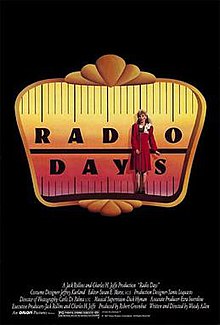Radio Days
| Radio Days | |
|---|---|

Radio Days theatrical poster
|
|
| Directed by | Woody Allen |
| Produced by | Robert Greenhut |
| Written by | Woody Allen |
| Starring | |
| Narrated by | Woody Allen |
| Music by | Dick Hyman |
| Cinematography | Carlo Di Palma |
| Edited by | Susan E. Morse |
| Distributed by | Orion Pictures |
|
Release date
|
|
|
Running time
|
85 minutes |
| Country | United States |
| Language | English |
| Budget | $16 million USD |
| Box office | $14.8 million |
Radio Days is a 1987 American comedy-drama film written and directed by Woody Allen, who also narrates. The film looks back on an American family's life during the Golden Age of Radio using both music and memories to tell the story. It stars an ensemble cast.
Joe (Woody Allen), the narrator, explains how the radio influenced his childhood in the days before TV. The young Joe (Seth Green) lives in Rockaway, Queens in the late 1930s and early 1940s. The tale mixes Joe's experiences with his remembrances and anecdotes, inserting his memories of the urban legends of radio stars, and is told in constantly changing plot points and vignettes.
Even though Joe's Jewish-American family lives modestly in Rockaway Beach, each member at one point during the film finds in radio shows an escape from reality through the gossip of celebrities, sports legends of the day, game shows, and crooners, with the majority of the stories taking place in the glitz and glamour of Manhattan. For Joe, the action adventure shows on the radio inspire him as he daydreams about buying a secret decoder ring, an attractive substitute teacher, movie stars (who may or may not be as honest as they appear), and World War II.
Meanwhile, several other parallel stories are told, from an aspiring radio star named Sally White (Mia Farrow), Joe's Aunt Bea (Dianne Wiest) and her (mostly fruitless) search for love, and during the middle of the film on the radio the tragic story is told about a little girl named Polly Phelps, who falls into a well near Stroudsburg, Pennsylvania. It becomes a big national story as the family listens to it. Sadly, Polly does not survive.
The film's soundtrack, which features songs from the 1930s and 40s, plays an integral and seamless part in the plot. It was released on cassette and compact disc in 1987.
...
Wikipedia
